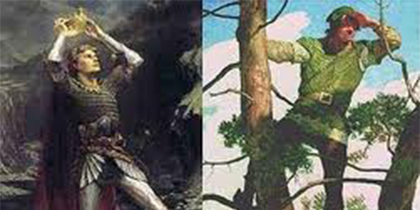
August 11, 2012, by Nicola Royan
Robin Hood and Arthur
Arthur and Robin are salient figures in our imagined medieval world; they are international; and they appear both to be symbolic of significant values; but somehow they are different. Arguments rage as to the ‘reality’ of both Robin and Arthur. With Robin, however, these arguments are more acute, because the legends associate him with a still-recognisable place (Sherwood Forest) and with actual late-medieval kings (either Richard I or the early Edwards), so he should be locatable. That he isn’t, really, doesn’t stop people trying. Despite attempts to locate the ‘real’ Arthur, Camelot has been timeless and placeless, contemporary and distant, at least since Malory. Arthurian deracination is genuinely medieval; but Scots chroniclers and English ballads, a rather thin collection compared to Arthurian material, very clearly locate Robin Hood in England.
Arthur and his court have been generating stories from the twelfth century, multi-lingual, multi-layered, multi-purposed; even Geoffrey of Monmouth’s core narrative offers space for embroidery during Arthur’s rule. Robin only arrives in the fifteenth century, and is always fully grown, always an outlaw, always opposed to authority. Robin is almost invariably the hero in the early texts. In contrast, Arthur is frequently only the guarantor of his followers’ knightly achievements: as king, he can delegate adventure.
As a result, Robin’s narratives come to us strangely inflexible. The challenge to authority requires either identification with the outlaws or those in power: the campaign for the Robin Hood Tax is indicative of the response demanded. The best Arthurian narratives pit different value systems against each other; even heroes have flaws and villains redeeming features (note the late 20th C reshaping of Morgan). We use both for their symbolic shorthand, but where, Robin asks us to assert particular values, Arthur may question them, and that generates the conflict for great literature.
No comments yet, fill out a comment to be the first

Leave a Reply